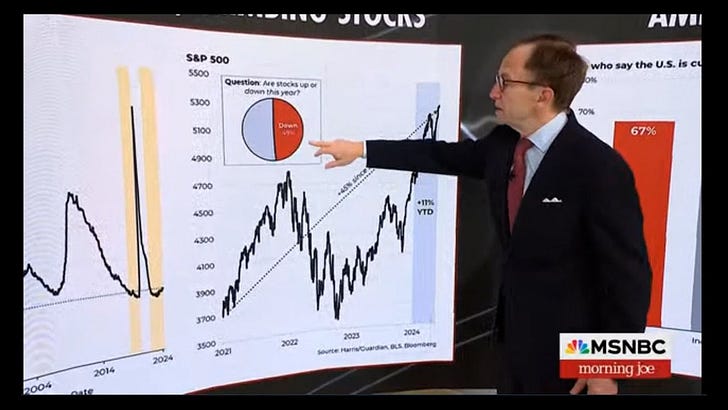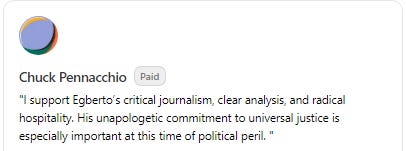Separating perception from reality about our current economy is essential.
Steve Rattner separates many perceptions about the economy from the numerical reality. While we need a revamped economic system, Biden’s economy outperforms most past and present.
A quick but important note before reading this prescient article
As of today, we have 9.69 thousand followers and 91 supporting (paid) subscribers. Misinformation funded by the deep pockets of our Oligarchy floods the internet. We are using all of our platforms on-air, online, and in publications to counter that. We ask that you invest the equivalent of less than a coffee to ensure we can keep doing this. Please invest in a Democracy that serves all of us by becoming a paid subscriber. It comes with many benefits.
Separating perception from reality on the economy.
Recently, Steve Rattner provided a much-needed reality check on the current state of the U.S. economy. The discourse surrounding economic performance often gets muddled by partisan rhetoric, media sensationalism, and public perception. Rattner’s insights illuminate the disparity between the actual economic indicators and the general public’s sentiments, which appear disjointed from the positive data reported.
The Economic Reality: Growth, Low Unemployment, and Stock Market Gains
The current economic data under the Biden administration paint a picture of resilience and growth. Since President Biden took office, the economy has been growing at an annual rate of 2.8%, slightly outpacing the growth rate under President Trump before the COVID-19 pandemic. This growth trajectory contradicts the widespread belief that the economy is in a recession. Inflation has been curbed, unemployment rates are at historic lows, and the stock market has experienced significant gains.
As of now, unemployment hovers below 4%, marking a 50-year low. This is a stark contrast to the misconception held by half of Americans, who believe unemployment is at a 50-year high. This misperception extends to the stock market, where 50% of the public thinks stocks are down for the year. Contrary to this belief, stocks have risen by 11% this year and have surged 45% since Biden took office.
Dissecting Public Perception
Despite these positive indicators, many Americans have a negative view of the national economy. Polls reveal that more than half of Americans believe the country is in a recession, with the sentiment divided along partisan lines. Interestingly, even among Democrats, 49% feel the economy is performing poorly. This divergence between perception and reality underscores a critical issue in economic communication and public understanding.
When examining individual financial situations, around 75% of Americans report that their finances have been stable and consistent since 2018. However, perceptions of the national and local economies have deteriorated since 2019. This dichotomy suggests that while personal economic conditions may be satisfactory, broader economic narratives fueled by partisan discourse and media portrayal influence public opinion more strongly
The Role of Misinformation and Ideological Bias
Rattner points out that the spread between economic sentiment and presidential approval ratings has widened. Despite improving sentiments about the economy, President Biden’s approval ratings have declined. This phenomenon can be attributed to various factors, including geopolitical tensions such as the conflict in Gaza and other socio-political issues. However, the crux of the issue lies in the ideological biases and misinformation that skew public perception.
The right-wing media and partisan commentators often propagate a negative narrative about the economy to align with their political agenda. This calculated indoctrination creates a disconnect between economic realities and public sentiment. Progressive intelligentsia and commentators, therefore, have a crucial role in countering this misinformation by disseminating accurate information and fostering an informed electorate
The Progressive Path Forward
To address the disparity between perception and reality, progressive activists and policymakers must focus on several key areas:
Economic Literacy and Public Education: Enhancing public understanding of economic indicators and their implications is vital. Progressive media and educational campaigns should simplify complex economic data to make it accessible and comprehensible to the general public.
Corporate Accountability and Fair Taxation: Corporations should be accountable for their economic practices. Ensuring they pay fair wages, contribute their fair share of taxes, and are held responsible for inflationary practices can help redistribute wealth more equitably.
Policy Advocacy and Legislative Action: Progressive lawmakers should advocate for policies addressing income inequality, supporting workers, and promoting sustainable economic growth. This includes pushing for higher minimum wages, more substantial labor rights, and progressive taxation policies.
Media Strategy and Communication: To counteract right-wing propaganda, it is essential to develop a robust media strategy. This strategy involves leveraging social media, alternative news platforms, and community outreach to spread factual economic information and counter misinformation.
A just economy
While the U.S. economy performs well by many metrics, public perception remains pessimistic due to misinformation and partisan biases. Progressives can bridge the gap between perception and reality by focusing on economic education, corporate accountability, policy advocacy, and strategic communication, fostering a more informed and engaged electorate. This effort is crucial in ensuring that economic narratives reflect the true state of affairs, empowering citizens to make decisions based on facts rather than rhetoric.
We must be cognizant, however, that our economic system has a fatal defect from its inception. And its effects are coming to pass. This is not the fault of Biden, Obama, or Clinton. It is that we remain, at best, a neoliberal economic system and, at worse, an unfettered capitalist economy. Until we choose to create a strong safety net with healthcare for all and center on free enterprise where those who produce are rewarded and not the parasites that feed on the labor and intellect of others.
Can we count on you to help us reach our goal of 25 new paid subscriptions by month’s end?
The other side has big donors and everyday citizens who invest heavily in platforms that lie and misinform. All we have is you. So, please invest in our media outlet by clicking the subscribe button below to become a paid subscriber. You won’t miss that coffee, but it will make a difference in our politics as we spread the truth about our policies and progressive politics. All paid subscribers get to read my five books on this platform and all subsequent books I write. They will also be privy to subsequent incentives.







